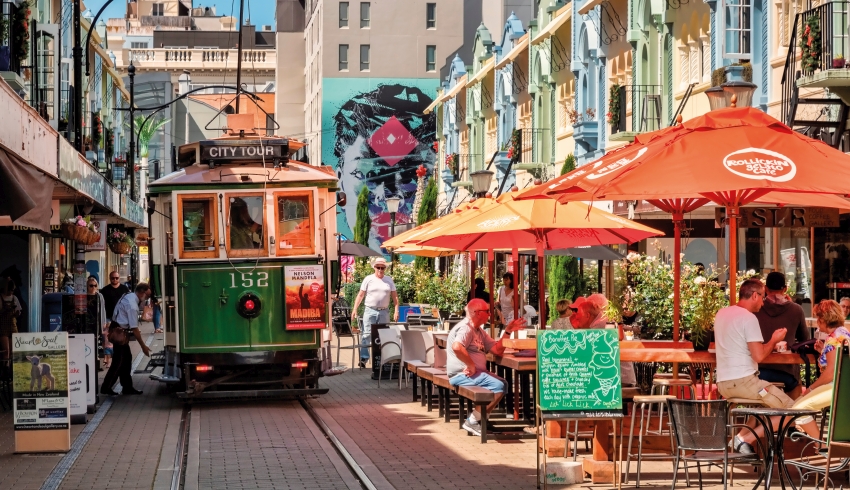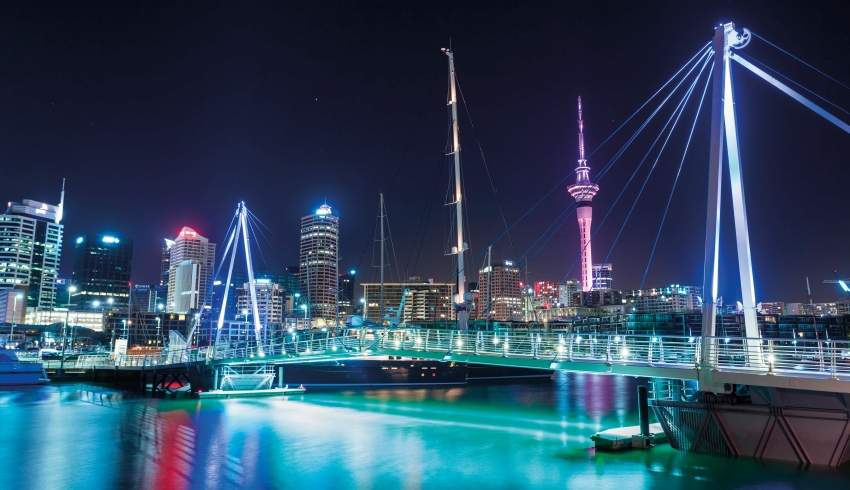My recent visit to this wonderful country has shown me that New Zealand is probably one of the most sophisticated, discerning, and well-developed franchise markets in the world.
I was fortunate enough to meet with so many knowledgeable experts all up and down the North Island during my time there, taking in many key cities such as Auckland, Wellington, Hamilton, Tauranga, Rotorua, and Palmerston North.
The experience left me feeling very positive about the country, its people, infrastructure and the sophisticated level of franchising knowledge which defines New Zealand as such an interesting and appealing market.
While geographically it’s around two-thirds of the size of California, it’s inhabited by a tiny fraction of the population: just five million compared to the Golden State’s 40 million residents. However, this small country is a real giant when it comes to franchising with 590 franchise systems in operation.
Recent data from Massey University Survey of New Zealand Franchising – organised by the Franchising Association of New Zealand (FANZ) states that there are 32,000 franchise units currently operating there, employing around 157,000 people and contributing a whopping NZ$36.8 billion dollars to the economy.
Most well-established, high profile franchise brands, particularly in food and beverage, have a strong presence in New Zealand in both its large and small cities, and the country has many local domestic and commercial cleaning, gardening and home maintenance franchises.
An appetite for all things franchising
Banks, such as Westpac and ASB, seem to be very well versed with franchising and provide funding to international systems which have proven their concepts and systems work well in New Zealand. The shared language and friendly bond with many Englishs-peaking Western states makes communication and shared goals especially easy for franchise systems.
There is also a significant level of knowledge about the mechanics of franchisor/franchisee relationships. Recent research conducted by Franchize Consultants and Franchise New Zealand Media demonstrates a very strong pool of potential franchisee candidates between the ages of 35-54 who have the available capital to invest in franchises. Data shows around 33% are interested in investment of franchises under NZ$50K and 15% interested in investment around NZ$300K+.
New Zealand franchisees have realistic expectations of earning potential, with some saying they would accept making a loss, or just breaking even in year one, but many do expect to draw some sort of income in year one, rising to NZ$100,000 upwards from year two.
This small country is a real giant when it comes to franchising, with 590 franchise systems in operation.

The strongest motivators for investing in a franchise are the ones which will be very familiar to us all and are the same reasons which make franchising such a popular growth strategy globally – namely, business ownership and greater control over work-life balance, higher income, and building equity for later life or legacy.
There’s also a very strong desire for New Zealanders to move from a more mundane career into something for which they have a strong passion, and which challenges their entrepreneurial spirit.
As we all know, franchising offers a way to all this and more, and potential franchisees in New Zealand are very knowledgeable about how franchising can also offer reduced risk of failure, as well as tried and tested systems, support and guidance in their local market.
Thanks to these motivators and with the sophisticated knowledge of franchising which backs them up, the failure rate of franchising in New Zealand is relatively low. Potential franchisees start with a good awareness of what they are getting into and are more than willing to take the time necessary to thoroughly investigate a franchise before committing to the investment.
Geographical advantages
The country’s geographic proximity to Australia can also be a plus point for those brands wishing to trial out their franchise in a smaller regional market before taking on the larger and more regulated market of Australia. However, it’s important not to underestimate the differences between the two markets.
From a distance, we might consider these neighboring countries to be much the same, but there are significant variations which can trip up the unwary franchisor!
For example, New Zealand is generally a highly regulated, safe and secure country where authorities are very keen to protect the wealth of the nation. When it comes to franchising, on the other hand, it has no specific franchising laws when compared to Australia, meaning that brands moving from one to the other will experience very different levels of legislation and red tape.
New Zealand is one of the most sophisticated, discerning, and well-developed franchise markets in the world, with a strong ethical framework
However, despite the lack of overt regulation, New Zealand can still be considered an extremely franchise-friendly environment with a strong ethical framework through bodies such as the Franchise Association of New Zealand (FANZ).
Membership and association with FANZ can, and will, add huge value and credibility to any brand looking to expand into the country.

Advice for international franchisors
Whilst the outlook for 2024 and 2025 remains extremely positive for franchise growth in New Zealand and most franchisors and stake holders are optimistic about the future, there are still some key challenges for brands to consider:
- Franchisee funding: While banks are clearly very prepared to supply funding to franchisees, they are only willing to do so if a franchise has been proven as a concept and demonstrated to work well when moved to New Zealand. Therefore, franchisors should be wary of premature entry into this territory. Once established, however, some banks may lend franchisees up to 50% of the total investment.
- Geography: New Zealand is a large country with a small population and low population density. The exception to this is Auckland, of course, which contains two million of the country’s five million citizens, but population is otherwise concentrated in clusters with significant distance between them. While transport infrastructure is excellent, it can mean the transportation of supplies might be costly.
- Operational costs are higher than some nations, but still reasonable compared to the neighboring country of Australia (higher COGS, labour costs, rent and site acquisition).
- Pool of talent and labor shortages are another issue which some labor-intensive local franchisees may have to face, due again to the low population density in most areas.
- Cost and availability of real estate can be challenging.
- Time zone differences: Huge time differences can make timely communication with franchisees more challenging. For instance, Auckland is 13 hours ahead of the UK, 17 hours ahead of New York and 20 hours ahead of California.
- Imported goods can be expensive, so many franchises who are reliant on them may have to switch over to locally sourced supplies.
- Due to higher operating costs, unit profitability could also be lower, but most still operate at a high level compared to other countries. Royalty percentages tend to run higher than other countries.
Furthermore, international franchisors are advised to consider faster scalability of their brands and a more expeditious development schedule to achieve market share.
There are good opportunities for themed F&B concepts, but the main gaps I saw in franchise concepts were mainly from B2B and B2C, such as kids’ education, fitness development, domiciliary care and home services. Generally speaking, concepts like these are less reliant on international supply chains and have less of a need for large, expensive premises, so may represent an opportunity to circumvent many of the challenges faced above.
Find out more
My special thanks go to Robyn Pickerill of FANZ and Stewart Germann of SGL law office, who facilitated my visit and allowed me to speak at their Franchise Seminar in Auckland.
Also, a huge thank you to all the highly expert franchise specialists and stake holders in NZ for not only meeting with me and sharing their valuable knowledge, but for allowing me to extract some data from recent survey conducted by Massey University and Franchize Consultants and Franchise New Zealand Media.
Further information and useful market surveys can be found at franchiseassociation.org.nz.
Key takeaways for investors
- Sophisticated market: New Zealand stands out as one of the most sophisticated and well-developed franchise markets globally, boasting 590 operational franchise systems
- Robust economy: Recent data reveals a thriving franchise sector contributing NZ$36.8 billion to the economy, with major brands, especially in F&B, enjoying a strong presence across the nation’s towns and cities
- Favorable environment: The country’s franchise-friendly environment, coupled with a knowledgeable pool of potential franchisees, contributes to a relatively low failure rate in franchising ventures
- Motivated franchisees: Potential franchisees in New Zealand are driven by familiar factors like business ownership, work-life balance, and income potential, as well as a desire for entrepreneurial challenges and passion-driven careers
- Regulatory landscape: While lacking specific franchising laws compared to Australia, New Zealand offers a supportive regulatory framework through bodies like the Franchise Association of New Zealand (FANZ), enhancing credibility for brands entering the market.
- Challenges for international brands: Franchisors eyeing expansion into NZ must navigate challenges such as franchisee funding, geographic dispersion, higher operational costs, labor shortages, and time-zone differences
- Strategic considerations: International franchisors are advised to prioritize scalability, adaptability, and market-specific concepts like themed F&B offerings and B2B/B2C services to overcome challenges and capitalize on opportunities
- Resource access: Accessing local resources and expertise, along with understanding market nuances, is crucial for successful entry and growth in the New Zealand franchise landscape
- Continuous monitoring: Ongoing monitoring of market dynamics, regulatory changes, and consumer trends is essential for sustaining franchise success and maximizing growth potential.
- Upcoming opportunities: FANZ’s National Franchise Conference ConnectXperience 2024 is taking place on the 28-30 July 2024, presenting a great opportunity to gain vital insights. The IFA’s Matt Haller, Mary Kennedy-Thompson, COO of Neighborly and Jeremy Hassell, CEO & Co-Founder of City Cave, will be joining the cast of speakers in Tauranga.
Farrah Rose is head of international development at The Franchising Centre. To learn more, or discuss how your franchise could work in this exciting and dynamic market, please contact Farrah at Farrah@thefranchisingcentre.uk.
Images: Shutterstock


